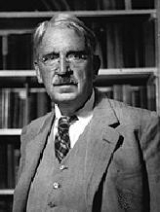
and educational reformer whose ideas have been influential in education and social reform. Dewey was an important early developer of the philosophy of pragmatism
and one of the founders of functional psychology
. He was a major representative of the progressive and progressive populist
philosophies of schooling during the first half of the 20th century in the USA.
Although Dewey is known best for his publications concerning education, he also wrote about many other topics, including experience, nature
, art
, logic
, inquiry, democracy
, and ethics
.
In his advocacy of democracy, Dewey considered two fundamental elements—schools and civil society
—as being major topics needing attention and reconstruction to encourage experimental intelligence and plurality.
Every great advance in science has issued from a new audacity of imagination.![]()
A possibility of continuing progress is opened up by the fact that in learning one act, methods are developed good for use in other situations. Still more important is the fact that the human being acquires a habit of learning. He learns to learn. ![]()
We have now to make explicit the differences in the spirit, material, and method of education as it operates in different types of community life.To say that education is a social function, securing direction and development in the immature through their participation in the life of the group to which they belong, is to say in effect that education will vary with the quality of life which prevails in a group.
![]()
Society is one word, but many things. Men associate together in all kinds of ways and for all kinds of purposes. One man is concerned in a multitude of diverse groups, in which his associates may be quite different. It often seems as if they had nothing in common except that they are modes of associated life.
![]()
A society which is mobile, which is full of channels for the distribution of a change occurring anywhere, must see to it that its members are educated to personal initiative and adaptability. Otherwise, they will be overwhelmed by the changes in which they are caught and whose significance or connections they do not perceive.
![]()

